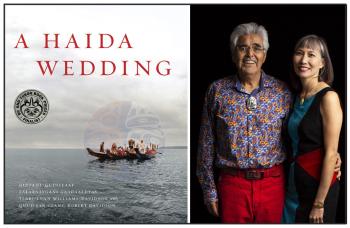Image Caption
Windspeaker.com Books Feature Writer
Local Journalism Initiative Reporter
A book of love chronicling the steps taken to hold the first traditional ceremony legalized under Haida law in more than a century has won a 2025 historical writing award from the British Columbia Historical Federation.
Terri-Lynn Williams-Davidson and her husband Robert Davidson were recognized with the Community History Award earlier in May for A Haida Wedding and its significant contributions to the historical literature of B.C. books. The book was published in 2024 by Heritage House Publishing.
Revisiting the occasion in the book, Williams-Davidson recalled the “incredible experience (it was) to bring the community together that way, to get the agreement of our clans to support us in this incredible ceremony.”
A Haida Wedding is full of photographs and recollections of the intricacies of the long ceremony that took place on Aug. 22, 1996 when Williams of the Skedans Raven Clan legally wed Davidson, a renowned Haida artist, of the Langara Island Eagle Clan.
Williams-Davidson recalled how surprised people were to learn that the traditional ceremony would be legal. The Canadian Courts had recognized customary marriages in the Connolly v. Woolrich case in 1867.
The book outlines all the painstaking research Williams-Davidson, a lawyer, undertook to ensure that the wedding was a traditional Haida wedding, something that had not taken place in over 100 years.
There were discrepancies that cropped up as information was gathered from ethnographic records. Those discrepancies, such as when the marriage property (gifting) exchange took place or the New Blanket Ceremony, didn’t surprise Williams-Davidson.
“I deal with a lot of historical documents and there often are discrepancies…When we research, we always come with our own perspective and we see what we recognize…I find that we really have to check what was recorded with the Elders to ensure that what is written is correct and that was the whole process we went through,” she said.
Working off a 20-page document that Williams-Davidson had prepared of varying traditional Haida wedding accounts, the couple called on the expertise of Elders, as well as Davidson’s grandmother, who remembered those ceremonies, and Williams-Davidson’s mother, who as a child played Haida weddings. Slowly they examined each part of the ceremony and decided what worked with them and what the Elders agreed with.
“I feel like what we did, everything was traditional. The only thing that we did that wasn’t traditional was to exchange wedding rings because everything else was as it would have been,” she said.
The community turnout for the ceremony was tremendous and included the Hereditary Chiefs leading the groom’s family and guests in a procession to the feast hall.
The only thing Williams-Davidson says she would do differently would have been to appoint an official photographer. In compiling the photographs for A Haida Wedding she had to go through “two or three shoe boxes of photos, physical photos” that people had given to her “and that was an ordeal.”
Their traditional Haida wedding was a commitment to community as much as the resurgence of potlatch has been since prohibition was lifted, says Williams-Davidson.
In holding a traditional Haida wedding, the couple had hoped that others would follow in their footsteps, but that has not been the case.
“There have been a couple of partial Haida weddings, but we want to foster more and we wanted to have a record of something that people could follow along with,” she said of the reason why they wrote A Haida Wedding. “We also wanted to emphasize that a Haida wedding doesn't have to have all the things that we did. We wanted to layout all the parts so that people could choose what they wanted and pick the essential parts that worked for them.”
Williams-Davidson believes that people are still drawn to western weddings and ceremonies which is “ingrained in how we’ve been brought up. I wouldn't want to say that we've internalized that just because I don't want to judge why other people haven't done it.”
However, she has hope.
“We’re now at a place in the development of the Haida Nation where we are organizing by clans in a way that we may not have been so much,” said Williams-Davidson. “That's just all the part of the resurgence of traditions and becoming more familiar with our social organization…I think that maybe it wouldn't take as much to…review the ceremonies…because people are more accustomed to working with their clan.”
The community came together again almost 10 years ago when Terri-Lynn and Robert renewed their vows during a potlatch that Davidson was hosting in Massett on Haida Gwaii. Friends from Kwakwaka'wakw Nation attended and presented the couple with names.
“Just to relive and stop and take the audience through the steps that we took…I really loved that,” said Williams-Davidson. “It was a beautiful ceremony for us.”
A Haida Wedding can be purchased from local Canadian independent bookstores as well as online at heritagehouse.ca.
Local Journalism Initiative Reporters are supported by a financial contribution made by the Government of Canada.

